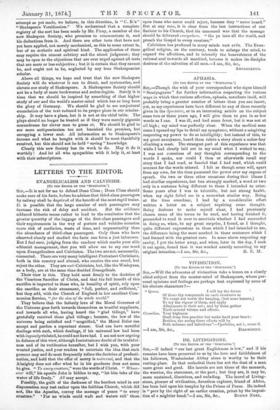LETTERS TO THE EDITOR.
EVANGELICALISM AND CALVINISM.
[To THE EDITOR OF THE "SPECTATOR."]
SIR,—It is not for me to defend Dean Close ; Dean Close should snake sure of his facts, before he advises that third-class passengers by railway shall be deprived of the benefit of the most rapid trains. It is possible that the largo number of such passengers may increase the risk of delay and accident. But the evidence adduced hitherto seems rather to lead to the conclusion that the greater quantity of the luggage of the first-class passengers and their requirements in the way of porters and vehicles occasion snore risk of confusion, waste of time, and unpunctuality than the abundance of third-class passenger4. Only those who have observed closely and studied the facts can form a just inference. But I feel sure, judging from the candour which marks your able editorial management, that you will allow me to say one word upon Evangelicalism and Calvinism. The two are not, necessarily, connected. There are very many intelligent Protestant Christians, both is this country and abroad, who receive the one creed, but reject the other. They are anti-Calvinists, but, like the Wesleyans, as a body, are at the same time decided Evangelicals.
Their view is this. They hold most firmly to the doctrine of the Vicarious Sacrifice of Christ, and that the full benefit of this sacrifice is imparted to those who, ip humility of spirit, rely upon the sacrifice as their atonement, "full, perfect, and sufficient," abut they add, with the Church of England in her excellent Com- munion Service, "for the sins of the whole world."
They believe that the fatherly love of the Moral Governor of the Universe goes forth towards themselves as trustful suppliants, and towards all who, having heard the " glad tidings," have gratefully received those glad tidings ; because, the law of the universe being satisfied and " magnified," the Moral Ruler can accept and pardon a repentant sinner. God can have merciful dealings with such, which dealings, if his universal law had been with impunity violated, he could not have bad. I am not now arguing in defence of this view, although I entertain no doubt of its truthful- ness and of its verification hereafter, but I wish you, with your wonted justice, and your readers to entertain the idea that such persons may and do most frequently refuse the doctrine of predesti- nation, and hold that the offer of mercy is universal, and that the Almighty does not offer what he in his goodness does not mean to give. " To every creature," were the words of Christ. " Whoso- ever will," his apostle John is bidden to say, "let him take of the water of life freely." A11 may accept.
Possibly, the guilt of the darkness of the heathen mind in our dispensation may rest rather upon the faithless Church, which did not, like the Apostles, convey the message of peace " to every creature." For no winds could waft and waters roll' them upon those who never could reject, because they " never heard." But at any rate, it is clear from the last instructions of our Saviour to his Church, that his command was that the message should be delivered everywhere. " Go ye into all the world, and preach the Gospel to every creature."
Calvinism has produced in many minds vast evils. The Evan- gelical religion, on the contrary, tends to enlarge the mind, to expand the affections, and to intensify the benevolences of the rational soul towards all mankind, because it makes its disciples desirous of the salvation of all men.—I am, Sir, &c.,
ANGLICANUS.


































 Previous page
Previous page